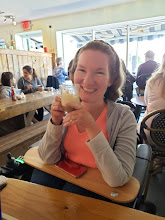“Come here, my
son,” he heard instead, “and tell me what you want.”
“I’m so sorry,
your Majesty,” he said in a shaky voice. “That song was my very best gift – but
it was wretched. I have nothing else to offer… I have nothing of worth to
give.”
“No one ever
does,” the King said gently, and when Rusty looked up, the King was smiling.
“Your friend, Legalia, for instance, sends me a mud pie every year for my
birthday, convinced I will gobble it all up. And her poor father, Mr.
Boastifous… what he considers high quality linen is nothing more than dirty
rags.”
“Then who can
earn your favor?”
“No one can.”
With these words, Rusty’s hope fell and despair grew. Then the King continued. “But
I never asked my people to earn my favor. It has been theirs to have all along.
That is why the streams of my joy give life to them and their crops every year.
That is why my groundskeepers and gardeners keep the path from the village to
my castle clean and clear – so that they may come anytime.”
The lad was disturbed
and confused. “Then why do they work so hard to earn what is already theirs?”
“It is because
every other king in the world would demand it. Ah!” He smiled and raised a
finger to his twinkling eye. “But I am not just any other king! They have
forgotten this, because they do not spend time with me anymore. If they would
just come to me, talk with me, eat at my table… I would- I would… I would serve
them chocolate pie like they’ve never tasted before! Ha!” He slapped his knee
and winked at Rusty.
“Now, my son,”
He motioned for the young man to come closer, “Legalia almost got your name
right, but not quite. You are Trust – that is your real name, your identity,
and your purpose.”
The lad felt as
though he had received a marvelous gift but hadn’t fully opened it yet. “Great
King, I am honored to know this, but still I don’t understand. What does Trust
look like?”
“My son, it
looks like you!” the Great King
laughed. “It is a small and weak man, depending on me for strength, coming to
me for wisdom, looking to me for hope. The song you tried to play is not your
own – that is why it never gave you life and joy. It is not the song I want to
give to you – that is why it was just noise in my presence. I have two gifts
for you…” And on His cue, a servant brought a long, narrow case.
The King opened
it and took out a long staff, made of dark cherry wood, inlaid with gold, and finely
carved along its length were all the wonderful names of the King. “Your
weakness is not a curse, accident, or problem. It is a gift and a blessing, and
this staff will remind you as you walk through life to lean heavily on me.
Trust me.”
Trust dropped
his old crutch and took hold of the new staff. The King reached in once more
and brought out a small rectangular instrument that fit comfortably in the
hand, shiny and metallic, with fine wood slats framing its edges.
“This instrument
is for you to play songs for me and about me. Every note it plays will be
pleasing to my ear. It is in the key of G – the key of Grace – so be sure to
play it often. It will bring life and joy to you, and it will remind others to
trust me.”
Trust used his
new staff to support him as he knelt before the Great King and received the
instrument.
“Trust, I send
you out now to play music in the streets of the village and beyond. Come and
visit me often; I am with you always, but I want you to desire to be here with
me, too.” He rose from his throne and embraced Trust. “Remember: I love you,
because you are mine.”
As Trust left
the castle, he put the new instrument to his lips and blew. A warm hum filled
the air and shook the shadows of doubt and despair from his soul. As he simply
breathed in and out, the notes blended and flowed together, creating harmonies
that played and danced and laughed, and poured joy into the emptiness of
Trust’s heart until it overflowed. He had been named, healed, and given purpose
– all he had hoped for, and more. And for the rest of his life, he responded to
the gift by playing the music of grace, and walking with strong faith in the
Great King.




